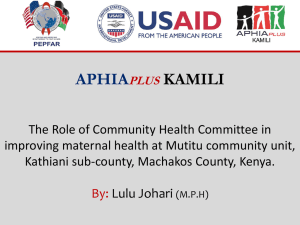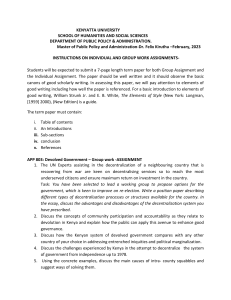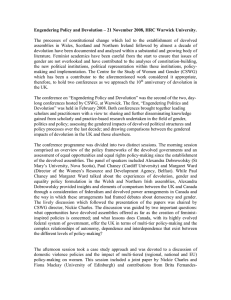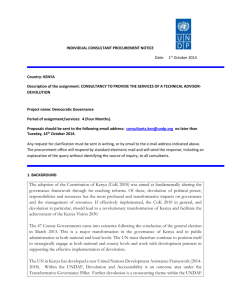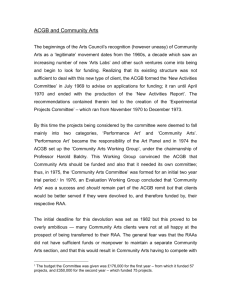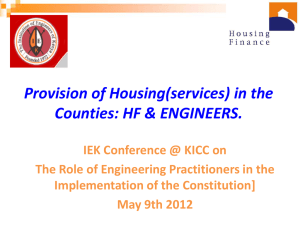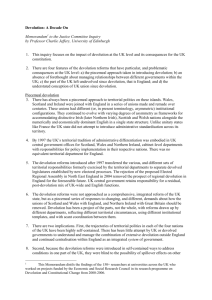Veronica Mwende - Department of Sociology and Social Work
advertisement
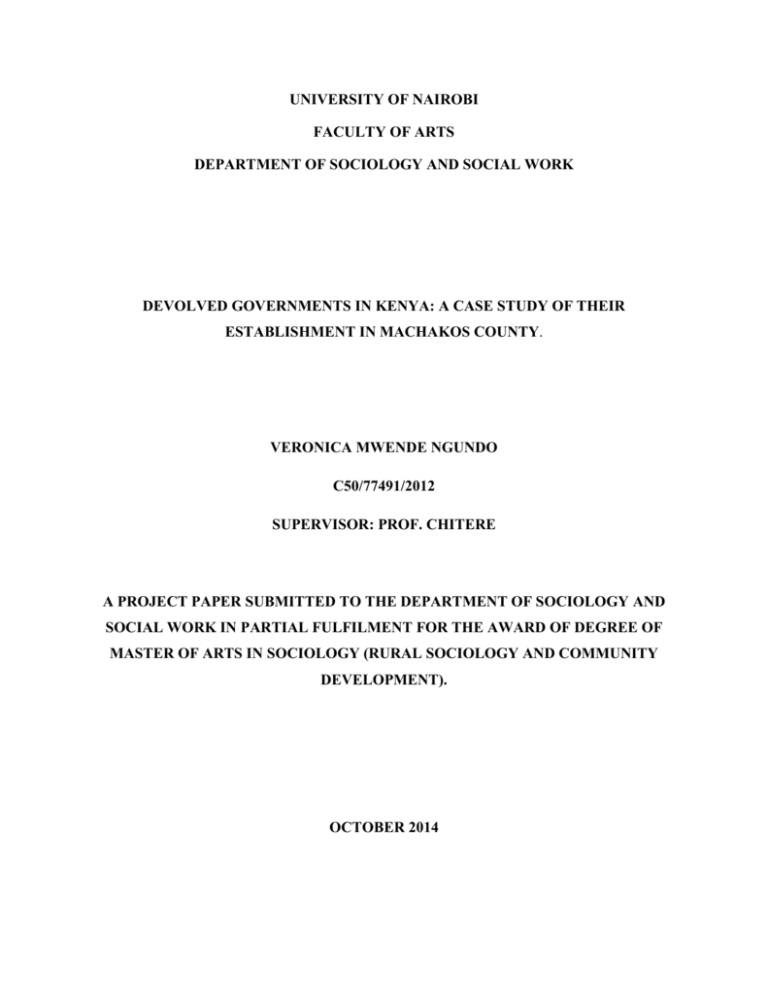
UNIVERSITY OF NAIROBI FACULTY OF ARTS DEPARTMENT OF SOCIOLOGY AND SOCIAL WORK DEVOLVED GOVERNMENTS IN KENYA: A CASE STUDY OF THEIR ESTABLISHMENT IN MACHAKOS COUNTY. VERONICA MWENDE NGUNDO C50/77491/2012 SUPERVISOR: PROF. CHITERE A PROJECT PAPER SUBMITTED TO THE DEPARTMENT OF SOCIOLOGY AND SOCIAL WORK IN PARTIAL FULFILMENT FOR THE AWARD OF DEGREE OF MASTER OF ARTS IN SOCIOLOGY (RURAL SOCIOLOGY AND COMMUNITY DEVELOPMENT). OCTOBER 2014 Abstract Devolution transfers responsibilities for services to local governments that elect their own officials, raise their own revenue and have independent authority to make investment decisions. African countries have increasingly adopted devolution as a strategy to improve governance and remedy institutional deficiencies that highly centralized governments have engendered. These include bureaucratic inefficiencies, poor accountability and transparency, unequal distribution of resources and low levels of community participation in development. The structure of government was changed radically in the new constitution so as to position devolution at the core of national life. Chapter eleven of the constitution of Kenya provide for devolution, its objects and principles, the county governments, functions and powers of the national and county governments and relationships between the two levels of governments. To achieve these objectives, the constitution established 47 county governments in addition to the national government. Each county has a government consisting of County assembly and County Executive. At the heart of the clamor for a new constitution was a determination by the people of Kenya to devolve governance and decision making so as to give them a greater say in how they and their resources are governed. Therefore, Kenyans have had high hopes for devolution so that they could change the kind of governance to have a government characterized by accountability, effectiveness, efficiency and responsiveness. Although efforts have been made to devolve governance in the past, the central government has always played an active role in undermining the same efforts hence the long history of unequal distribution of resources, poverty, exclusion of minorities, marginalization of some regions and communities of the country and thereby skewed development. These mistakes can only be, to some extent, rectified through the proper establishment and operationalization of devolved governance so that the locals can manage and account for their own resources. The main objective of this study was to examine the on-going establishment of the devolved government in Machakos County, Kenya, achievement and limitations. The study sought to explore the structures being put in place, the human and financial resources being deployed and the harmonization of the two levels of governments in service delivery. The study was exploratory and took a qualitative approach in data collection where key informants were purposively selected. Key Informant interview guides were used to guide data collection. Collected data was organized, summarized and presented in direct quotations of relevant verbatim responses and selected comments. The findings of the study were: Basically, the County government of Machakos is in its formative stages. Two structures have been established in the County government of Machakos using the right procedures, we have two sources of finance that have been deployed in Machakos County with proper organizational financial management structure. In terms of human resource, we have the staff that was seconded by TA to the Counties, the staff seconded by the national government from the now defunct Local Authorities and the staff that had been recruited by the county and also the ones who were being recruited. There is harmony between the national and the County government when it comes to service delivery. In the ongoing establishments, the county has experienced challenges as well and also celebrated successes. One of the failure being that they did not take time to induct their staff leading to no cohesion between staff hence poor service delivery. The county had successfully constituted the executive and legislative arms of the government constitutionally. The study concludes that for proper establishment and operationalization of devolved government, the County must have a constitutionally constituted County Assembly and County executive with good political will. The right human resource also has to be deployed. Similarly, adequate financial resources have to be deployed. Finally, all these structures must work as a team and there should be a good relation between the National and the County government. The researcher recommends Machakos County to commit to inducting its staff to ensure harmony in service delivery in future. It also recommends devolved units to have the requisite financial, human and infrastructural capacity to effectively perform its functions .
